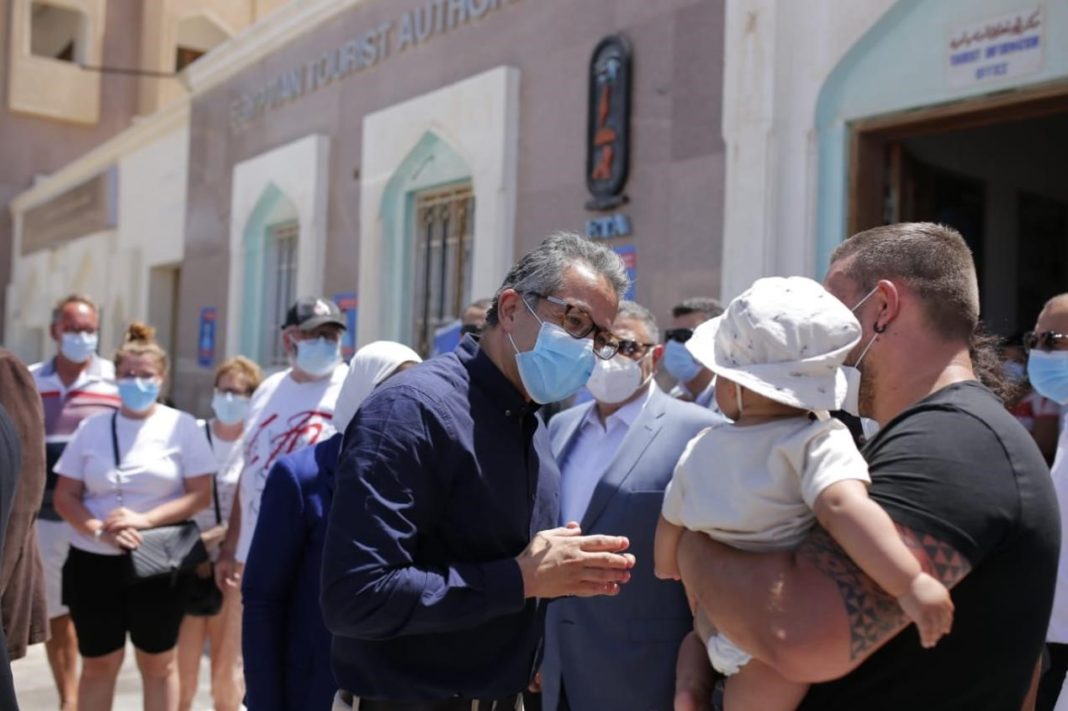- All tourism staff in Egypt’s tourist hotspots have received COVID-19 vaccines
Egypt has fully vaccinated all staff working at both Red Sea and South Sinai governorates, two of the country’s tourism hotspots as hotels and resorts gear up for the safe return of holidaymakers this summer.
Staff working in establishments including hotels, resorts, cafes, restaurants, bazaars and tourism transportation in the Red Sea and South Sinai governorates have received COVID-19 vaccine.
Egypt’s Ministers of Tourism and Antiquities, Health and Population and Civil Aviation and Red Sea Governor made the announcement in a press conference held during their visit to the Red Sea city of Hurghada to inspect the implementation of hygiene safety measures in airport, hotels and its temporary medical units installed specially to spruce up the vaccination process for the tourism sector employees.
“Vaccinating our staff is just one measure we are taking to ensure tourists can return to Egypt’s crowning jewels safely, quickly, and confidently,” said Egypt’s Minister of Tourism, Dr Khaled El-Enany.
“COVID-19 cases in the Red Sea and Sinai areas are negligible. Everyone involved in Egypt’s tourism sector has worked incredibly hard to get to this point and be able to offer a safe travel experience. Nearly a year since the resumption of tourism in Egypt, we are happy to note that the tourist numbers are steadily rising and have almost doubled since January and February 2021. The number of tourists who arrived in Egypt in January was 300,000 and increased to reach 525,000 tourists in April. Now, we are opening our doors and extending a warm invitation to people from around the world who are fed up with staying at home and are desperate to travel for their summer vacation.”
“The vaccination drive will continue in the Red Sea and South Sinai governorates with the aim to complete vaccination for the entire population in the two governorates by the end of June 2021,” he said.
“Egypt has begun the vaccination for tourism staff in other key destinations including Cairo, Giza, Luxor and Aswan. The vaccination drive is also open to foreign residents and tourists, upon their request. The next phase will be another important step in the recovery of the tourism sector,” Dr El-Enany added.
As part of the measures taken by the Egyptian government to eliminate cases of COVID-19 in both the Red Sea and South Sinai governorates, medical centers were allocated to receive the anti-Coronavirus vaccine, in addition to the installation of temporary medical units in few hotels and the activation of mobile medical clinics including medical teams to vaccinate tourism sector’s employees as well as medical and awareness services to citizens and tourists.
South Sinai and the Red Sea are Egypt’s largest tourism pulls. South Sinai includes the famous Sharm al Sheikh resort, Nuweibaa, Dahab, and Taba. The Red Sea meanwhile is known for oases like Hurghada, Sahl Hashish, Gouna, Makadi and Marsa Alam.
Since the COVID-19 outbreak, Egypt has adopted a wide range of hygiene and safety measures to curb the spread of the virus in line with the recommendations of the World Health Organization (WHO). These include social distancing, mandatory masks in select public locations, compulsory testing for visitors, rigorous disinfection and sanitization drives, as well as the introduction of the Hygiene Safety Certificate as a pre-requisite for tourist establishments and operators.
As a result, the country’s popular Red Sea destinations, such as Sharm El Sheikh, Hurghada, and Marsa Alam, have consistently reported one of the lowest infection rates in the world. In recognition of Egypt’s endeavors, the World Travel and Tourism Council (WTTC) granted the country its Safe Travel Stamp.
Travelers to Egypt must carry a negative COVID-19 PCR test certificate from their country issued up to 72 hours prior to the time of departure (96 hours for travelers arriving from Japan, China, Thailand, the US, Canada, South America, as well as London Heathrow, Paris and Frankfurt airports). Travelers arriving at Sharm El-Sheikh, Taba, Hurghada, Marsa Alam and Luxor airports can do a PCR test upon arrival at a cost of US$30.









